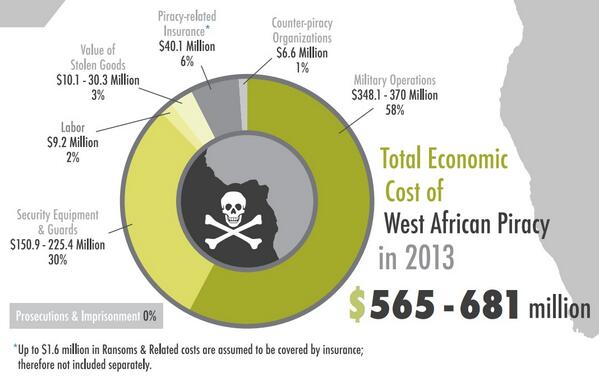The State of Maritime Piracy 2013 - Oceans Beyond Piracy Annual Report
THE LATEST Oceans Beyond Piracy report notes factors behind 50% reduction in cost of Somali piracy. The report, for the first time, documents both the economic and human costs of piracy for East and West Africa.

- Study finds that cost of Somali piracy has fallen nearly 50% to $3.2 Billion x While suppression has effectively countered Somali piracy, only 1½ percent of cost is invested in long-term solutions ashore
- The Human Cost remains significant:
- In West Africa - increasing numbers of seafarers are kidnapped o In Somalia - 54 hostages have been held for an average of nearly 3 years.
(London, Thursday 8 May 2014) - Oceans Beyond Piracy (OBP), a project of One Earth Future Foundation, is launched the fourth instalment of its annual reports detailing the economic and human costs of African maritime piracy. The study titled “The State of Maritime Piracy 2013” examines the costs incurred as a result of piracy occurring off the coast of Somalia, as well as in the Gulf of Guinea.

The study finds that attacks by Somali pirates are increasingly rare, and that, at between $3 billion to 3.2 billion, the overall economic costs of Somali piracy are down almost 50 percent from 2012. However, at least 50 hostages remain in captivity, held on average for nearly three years under deplorable conditions.
Regarding Africa’s West Coast, this report is the first comprehensive attempt by any organization to quantify the total economic cost of maritime piracy in that region. Piracy in the Gulf of Guinea remained a significant danger in 2013, says the report, with levels perpetuated by a lack of open reporting and a lack of coordinated effort among stakeholders.
The event, held at the Army & Navy Club (‘The Rag’), 36 Pall Mall, London, included a panel discussion of counter-piracy experts, moderated by OBP Senior Fellow, Admiral Sir James Burnell-Nugent. The panel included Jens Vestergaard Madsen of OBP, Simon Church of the Maritime Security Centre, Horn of Africa, and Giles Noakes and Peter Sand of the international shipping association, BIMCO. The panel presented the main findings of the report as well as discussing the main piracy trends off the east and west coasts of Africa and taking questions from the audience.
“The efforts of the international community and the shipping industry have considerably reduced the threat of Somali piracy,” says Jens Madsen, one of the report’s authors. “But we have yet to achieve the goal of ‘Zero/Zero’ – zero vessels captured and zero hostages held,” he adds. The study finds that while the combined economic costs of suppressing Somali piracy are markedly down, there has only been a slight increase in the investment in long-term solutions ashore. Research also shows that the shipping industry increasingly relies on individualized risk mitigation, observed in the decreased use of some of the more expensive anti-piracy measures such as increased speed and re-routing. Shippers are also turning to smaller and less expensive teams of armed guards as the perceived risk of piracy is declining.
While attacks by Somali pirates have declined sharply, with no large vessels taken in 2013, there are still, however, at least 50 hostages in captivity, who have been held on average for nearly three years under deplorable conditions. At the same time, regional and local seafarers and fishermen in the region remain at high risk as pirates continue to target locally operated vessels to facilitate larger attacks.
Turning to maritime piracy off Africa’s west coast, the study finds that a critical lack of reporting on both the piracy and maritime crime here makes analysis difficult.
“Piracy in the Gulf of Guinea is fundamentally different to that taking place in the Indian Ocean,” says Mr. Madsen. “We observe not only a high degree of violence in the attacks in this region, but also the lack of a mutually trusted reporting architecture and the constantly evolving tactics of West African piracy makes it extremely difficult to isolate it from other elements of organized maritime crime.”
The report notes it is generally agreed the solution to piracy ultimately lies in building up capacity onshore, but it stresses that relatively little investment has been made towards sustainable solutions. “While I am encouraged that more money is being spent on longer-term solutions ashore, these still only represent the equivalent of 1½ percent of the total annual cost of the piracy,” says Marcel Arsenault, Chairman of One Earth Future Foundation. “Until we have more economic opportunity and better governance ashore, we risk piracy returning to previous levels as soon as the navies and guards have gone home.”
Download the Full Report (Size 4Mb PDF)
The mission of the One Earth Future foundation is to support peace and good governance because these systems simply work better for humanity. Preventing problems such as piracy is much cheaper than addressing them once they have become embedded in local structures. Systems which allow for healthy economic growth and stable systems of governance are overall cheaper and better for everyone involved. As Benjamin Franklin said: “An ounce of prevention is worth a pound of cure.”
 Subscribe to our newsletter. Receive a weekly round-up of all piracy-related & maritime situational awareness news.
Subscribe to our newsletter. Receive a weekly round-up of all piracy-related & maritime situational awareness news.
OCEANUSLive.org
Information, Security, Safety; Shared
Submitted by Team@oceanuslive.org